Letter from Nigeria: New leader delivers shock therapy
President Tinubu has already targeted major reforms at the country’s dysfunctional downstream and upstream sectors, as well as overhauling monetary policy
Nigerians had low expectations of their new president, Bola Tinubu, who was elected with a record-low 36.61% of the vote in February. As co-founder of the All Progressives Congress party, which brought his predecessor Muhammadu Buhari to power in 2015, Tinubu was regarded as a continuity candidate, unlikely to deliver much-needed reform after eight years of sclerotic Buhari rule. However, Tinubu has made an immediate impact on Nigeria’s political economy, breaking the inertia that characterised Buhari’s tenure and upending the entire petroleum sector—starting with the downstream. Subsidy elimination Tinubu used his inauguration speech in May to end a nearly 50-year-old fuel subsidy. This had

Also in this section
17 February 2026
The 25th WPC Energy Congress, taking place in Riyadh, Saudi Arabia from 26–30 April 2026, will bring together leaders from the political, industrial, financial and technology sectors under the unifying theme “Pathways to an Energy Future for All”
17 February 2026
Siemens Energy has been active in the Kingdom for nearly a century, evolving over that time from a project-based foreign supplier to a locally operating multi-national company with its own domestic supply chain and workforce
17 February 2026
Eni’s chief operating officer for global natural resources, Guido Brusco, takes stock of the company’s key achievements over the past year, and what differentiates its strategy from those of its peers in the LNG sector and beyond
16 February 2026
As the third wave of global LNG arrives, Wood Mackenzie’s director for Europe gas and LNG, Tom Marzec-Manser, discusses with Petroleum Economist the outlook for Europe’s gas market in 2026







